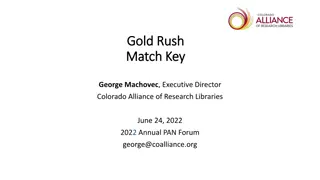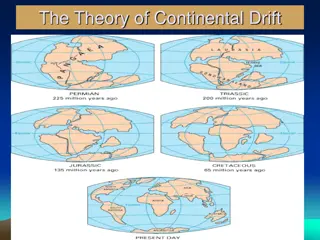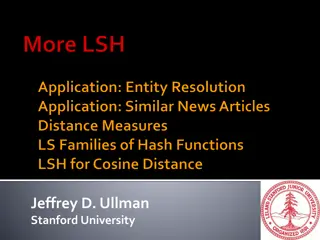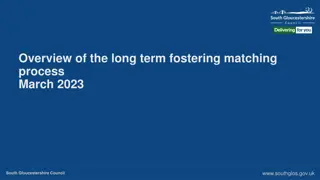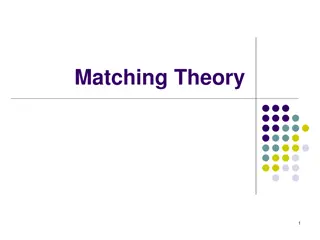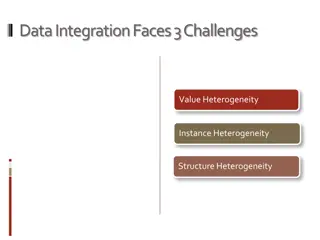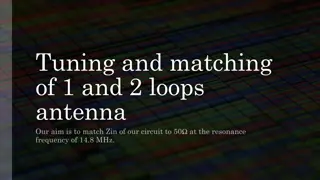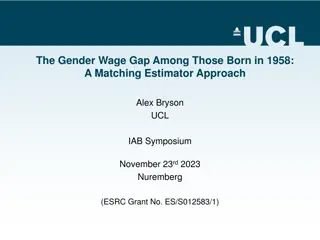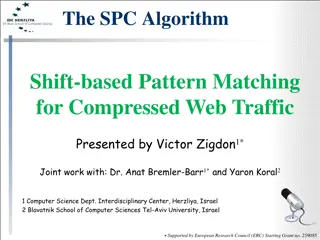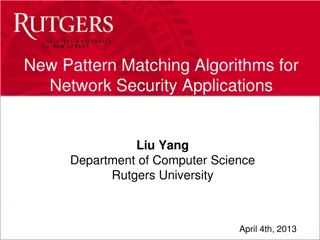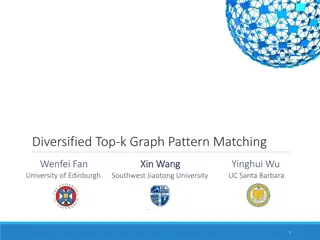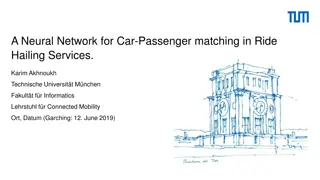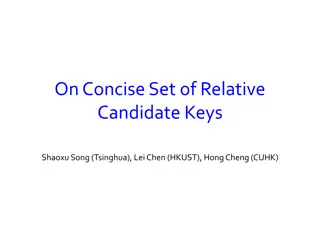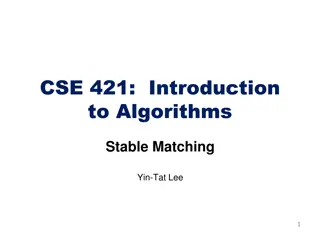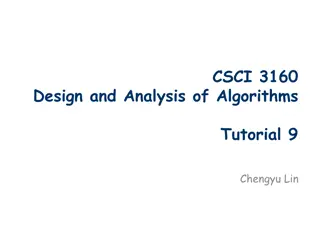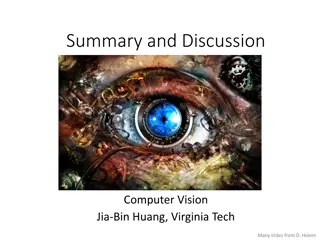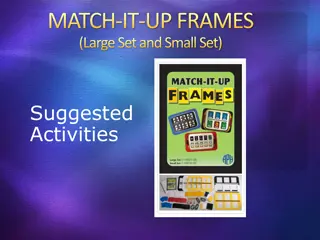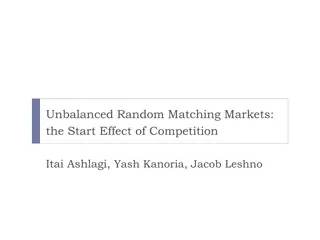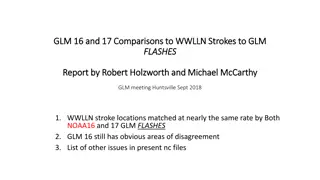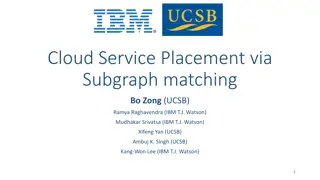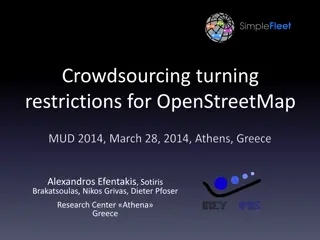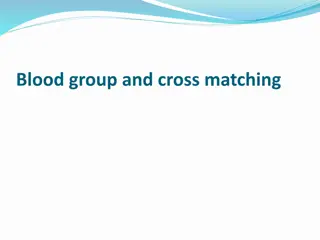Coverage Semantics for Dependent Pattern Matching
Delve into the world of dependent pattern matching with a focus on coverage semantics. Dive deep into the concepts of denotational semantics, topologies, and coverages. Explore the interplay between patterns, values, and types in a novel way, shedding light on the essence of pattern matching.
4 views • 26 slides
Evolution of Mathematical Theories and Proof Systems
Development of mathematical theories such as model theory, proof theory, set theory, recursion theory, and computational complexity is discussed, starting from historical perspectives with Dedekind and Peano to Godel's theorems, recursion theory's golden age in the 1930s, and advancements in proof t
1 views • 29 slides
Psychological Theories of Criminality: Understanding the Roots
Psychological theories of criminality delve into the association between intelligence, personality, learning, and criminal behavior. Major theories include Psychodynamic Theory by Freud, Behavioral Theory by Bandura, and Cognitive Theory by Kohlberg. These theories explore how unconscious mental pro
1 views • 20 slides
Understanding the Theory of Firms: Neoclassical vs. Modern Approaches
The theory of firms is explored through the Neoclassical and Modern perspectives. Neoclassical theory focuses on profit maximization, while Modern theory delves into managerial, principal-agent, and transaction cost theories. The discussion covers criticisms of Neoclassical theory and the essential
1 views • 79 slides
Colorado Alliance of Research Libraries: MARC Record Matching System Overview
Designed and hosted by the Colorado Alliance of Research Libraries, the Gold Rush Analytics Technical Overview showcases a cost-effective system utilizing open-source software with tailored solutions. The Matching MARC section details the methodology for matching records, emphasizing the pre-built m
1 views • 10 slides
The Theory of Continental Drift and Wegener's Evidence Explained
The Theory of Continental Drift proposes that continents were once part of a single landmass known as Pangaea, which eventually broke apart and drifted to their current positions. Alfred Wegener provided evidence supporting this theory, including the fit of continents like puzzle pieces, fossil simi
0 views • 27 slides
Theories of Causation in Psychological and Social Sciences
Overview of theories of causation categorized into psychological, social psychological, and sociological perspectives. Psychological theories focus on instinctive, biological, and psychological qualities of abusers, including Attachment Theory, Psychodynamic Theory, Social Learning Theory, and Situa
0 views • 15 slides
Understanding Political Theory through a Contextual Approach
Exploring G.H. Sabine's perspective on political theory through a contextual approach, emphasizing the importance of historical context and societal influences. Sabine argues that while political theory evolves with its contemporary politics, it should be analyzed within its specific time and social
0 views • 9 slides
English Class Practice for SSC Examinees: Sentence Matching Activities
Engage in sentence matching activities to enhance your English skills for the SSC exams. Practice writing complete sentences by matching different parts from columns A, B, and C. Improve your language proficiency and prepare effectively for the English paper with this educational resource.
0 views • 21 slides
English Class Practice for SSC Examinee - Column Matching
Engage in column matching exercises to enhance your English skills. Develop the ability to construct complete sentences by matching sentence parts in an educational setting. Practice with different topics and improve sentence formation skills effectively.
6 views • 21 slides
Evolution of Light Theory: From Wave Theory to Quantum Theory
At the turn of the century, the discovery of the photoelectric effect challenged the wave theory of light, leading to the development of the quantum theory by Max Planck and Albert Einstein. This new theory introduced the concept of discrete energy units known as quanta, bridging the gap between wav
1 views • 62 slides
English Class Practice with Column Matching for SSC Examinees
Join our English class for practice exercises on column matching, aimed at helping SSC examinees improve their sentence construction skills. Learn how to match parts of sentences and create complete sentences effectively. Our senior teacher, Manik Chandra Majumder, is dedicated to helping you succee
0 views • 21 slides
Dp-branes, NS5-branes, U-duality, and M-Theory Overview
Overview of Dp-branes, NS5-branes, and U-duality derived from nonabelian (2,0) theory with Lie 3-algebra. Introduction to M-theory, including M2-branes and M5-branes in the strong coupling limit. Discussion on BLG theory, Lorentzian Lie 3-algebra, and the ABJM theory for M2-branes.
1 views • 32 slides
Entity Resolution Problem in Customer Data Matching
The challenge of entity resolution, especially in the context of matching customer data between companies, is addressed in this content. The scenario involves accurately identifying which records correspond to the same individuals despite potential variations or errors in the data. Strategies such a
1 views • 56 slides
Engaging English Lesson for Second Graders - Alphabet Learning and Word Matching
Engage young learners in an interactive English lesson focusing on alphabet recognition and word-object matching. The Head Teacher leads students at Jagotpur Government Primary School through fun activities like singing the alphabet song, identifying objects by initial sounds, and matching words wit
0 views • 16 slides
Enhancing Long-Term Fostering Matching Process for Social Care Teams
This presentation outlines the long-term fostering matching process in March 2023 by South Gloucestershire Council. It emphasizes the importance of understanding and following the process for Service Managers, Team Managers, and new starters in Social Care. The responsibilities of staff in ensuring
3 views • 19 slides
Classroom Connectivity Initiative in Texas: E-rate and State Matching Fund Process
The Classroom Connectivity Initiative in Texas outlines how E-rate and State Matching funds work to make telecommunications and information services more affordable for schools and libraries. With federal E-rate discounts ranging from 20% to 90%, and state matching funds providing dollar-for-dollar
0 views • 9 slides
Understanding Matching Theory in Two-Sided Markets
Matching theory explores the dynamics of two-sided markets where participants on both sides seek suitable matches without using money. Examples include marriage markets, medical residencies, school choice programs, and more. We delve into the marriage model, stable matching criteria, and the deferre
0 views • 28 slides
Challenges in Data Integration: Heterogeneity and Solutions
Data integration faces challenges such as value heterogeneity, instance heterogeneity, and structure heterogeneity. Existing solutions assume independence of data sources and utilize methods like data fusion, truth discovery, string matching, object matching, schema matching, and model management. T
0 views • 5 slides
Matching Gift Roadmap: Boost Your Nonprofit's Fundraising Efforts
Elevate your nonprofit's fundraising potential with the Matching Gift Roadmap provided by Double the Donation. This presentation guides organizations on identifying key leaders, assessing current revenue, optimizing donor information, exploring marketing opportunities, and setting timelines for succ
0 views • 10 slides
Enhancing Matching Gift Strategies for Nonprofits
Explore a comprehensive roadmap for maximizing matching gift opportunities provided by Double the Donation. This presentation covers important steps such as determining donor information, evaluating revenue, and setting timelines for success. Learn how to identify responsible departments and individ
0 views • 10 slides
Tuning and Matching of 1 and 2 Loops Antenna
The aim of the project is to match the impedance of the circuit to 50 ohms at the resonance frequency of 14.8 MHz. The process involves calculating the impedance, working at low frequencies to determine key parameters, calculating capacitors, determining Q, and finally calculating tuning and matchin
0 views • 25 slides
Gender Wage Gap Among Those Born in 1958: A Matching Estimator Approach
Examining the gender wage gap among individuals born in 1958 using a matching estimator approach reveals significant patterns over the life course. The study explores drawbacks in parametric estimation, the impact of conditioning on various variables, and contrasts with existing literature findings,
0 views • 18 slides
SPC Algorithm: Shift-based Pattern Matching for Compressed Web Traffic
Victor Zigdon presents the SPC Algorithm, a simpler and more efficient approach to pattern matching in compressed web traffic. By applying an accelerating idea on pattern matching algorithms, the SPC Algorithm skips bytes and achieves throughput improvements. The background includes information on G
0 views • 21 slides
New Pattern Matching Algorithms for Network Security Applications by Liu Yang
Discusses new pattern matching algorithms for network security applications, focusing on intrusion detection systems (IDS) and the use of signatures and regular expressions to detect malicious patterns in network traffic. Explores the ideal and reality of pattern matching, time-space tradeoffs, and
0 views • 57 slides
Graph Pattern Matching Challenges and Solutions
Graph pattern matching in social networks presents challenges such as costly queries, excessive results, and query focus issues. The complexity of top-k and diversified pattern matching problems requires heuristic algorithms for efficient solutions. Finding best candidates for project roles involves
0 views • 19 slides
Theories of Interest in Microeconomics II
Explore various theories of interest in economics, including the Classical Theory, Liquidity Preference Theory by Keynes, Productivity Theory, Abstinence Theory, Time-Preference Theory, Fisher's Time Preference Theory, and the Loanable Fund Theory. These theories offer different perspectives on the
0 views • 6 slides
Neural Network for Car-Passenger Matching in Ride-Hailing Services by Karim Akhnoukh
In his M.Sc. thesis, Karim Akhnoukh explores the use of a neural network for car-passenger matching in ride-hailing services. The research delves into solving complex optimization problems related to vehicle routing and passenger matching using innovative algorithms. The study showcases the applicat
0 views • 33 slides
Understanding Matching Keys in Database Systems
Matching keys play a crucial role in identifying the same real-world entities in database systems. They specify which attributes to compare and how to compare them, helping minimize redundancy and improve data accuracy. This summary discusses relative candidate keys, minimal matching keys, and relia
0 views • 13 slides
Stable Matching Problem and Gale-Shapley Algorithm Overview
The content provides information on the stable matching problem and the Gale-Shapley algorithm. It covers the definition of stable matching, the workings of the Gale-Shapley algorithm, tips for algorithm implementation, and common questions related to the topic. The content also includes a summary o
0 views • 16 slides
Understanding Stable Matching and Secretary Problem in Algorithms
This tutorial explores stable matching and the secretary problem in the context of algorithm design and analysis. It covers concepts such as perfect matching in bipartite graphs, preference lists, blocking pairs, and the existence and methods of finding stable matchings. The content delves into scen
0 views • 30 slides
Fundamentals of Computer Vision and Image Processing
Fundamentals of computer vision cover topics such as light, geometry, matching, and more. It delves into how images are recorded, how to relate world and image coordinates, measuring similarity between regions, aligning points/patches, and grouping elements together. Understanding concepts like shad
0 views • 29 slides
Educational Activities Using Matching Frames for Learning and Development
Engage in shape matching, color matching, number sequencing, and pattern sequencing activities using specially designed frames on the All-in-One Board. Enhance cognitive skills, sensory perception, and fine motor skills through these interactive exercises.
0 views • 23 slides
Understanding Stable Matching Markets in Unbalanced Random Matching Scenarios
In the realm of two-sided matching markets where individuals possess private preferences, stable matchings are pivotal equilibrium outcomes. This study delves into characterizing stable matchings, offering insights into typical outcomes in centralized markets like medical residency matches and decen
0 views • 49 slides
Understanding Stable Matching and Orderly Markets in Various Allocation Systems
Exploring the concept of stable matching and orderly markets in different allocation systems such as medical residencies, law clerk placements, and college admissions. From theory to practice, the history of the National Residency Matching Program (NRMP) to centralized clearinghouses, the importance
0 views • 36 slides
Comparison of GLM-16 and GLM-17 with WWLLN Strokes
The report by Robert Holzworth and Michael McCarthy discusses the comparison of GLM-16 and GLM-17 with WWLLN strokes, highlighting areas of agreement and disagreement. Methods for matching GLM and WWLLN events are explored, focusing on time and distance considerations. The analysis shows that NOAA-1
0 views • 16 slides
Subgraph Matching for Cloud Service Placement in Datacenters
This research explores the efficient placement of cloud services in datacenters through subgraph matching, focusing on compatibility and resource optimization between customers and providers in cloud computing environments. The study highlights challenges in dynamic subgraph matching and the limitat
0 views • 29 slides
Enhancing OpenStreetMap with Crowdsourced Turning Restrictions
Abundance of GPS tracking data has led to significant research on map-matching algorithms and identifying turning restrictions. This study focuses on inferring turning restrictions for OpenStreetMap data by utilizing historic map-matching results effectively. Understanding and implementing turning r
0 views • 25 slides
Understanding Blood Group and Cross Matching in Transfusion Medicine
Blood group and cross matching play crucial roles in determining blood compatibility for transfusion. The presence or absence of specific antigens on red blood cells, along with antibody reactions, help identify blood types and ensure safe transfusions. Cross matching involves testing donor and reci
0 views • 8 slides
Debugging Blocker in Entity Matching using MatchCatcher
Explore how the MatchCatcher solution helps identify and improve matches killed off by blockers in the entity matching process. The solution allows users to quickly find and analyze these matches, enhancing the efficiency of the blocking stage in entity matching.
0 views • 24 slides




